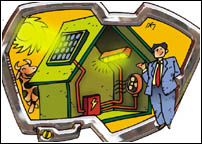 |
About
two billion people in remote areas of developing
nations have no electric lighting, a commodity industrialized
nations take for granted. Poor lighting in homes
hinders children's learning, affects family health
and limits opportunities for a better life. A simple
but revolutionary technology supplied to rural homes
unconnected to the grid can light an entire rural
village with less energy than that used by a single,
conventional, 100-watt light bulb.
The best applied science results in the solution of a common problem
that people have either overlooked or felt it couldn't be solved
easily.
|
There
is a lesson in this for those who seek out research problems
in Pakistan. Our researchers often fail to identify doable
problems because they are trained to mainly solve problems
that interest others (usually their foreign Ph.D. supervisor's)
rather than ones that affect their own society.
Pakistan
and OIC
With
the kind of high efficiencies that coloured LEDs have it
is inevitable that they will start being used in traffic
lights soon. One hears that some foreign company has already
started converting traffic lights in Lahore to LEDs. This
process ought to be speeded up.
The
web is a wonderful tool for bringing us interesting and
important ideas. The early demonstration in a developing
country of WLEDs was by Dave Irvine-Halliday who discovering
them on the web. And I discovered his work also using this
same tool. He is very keen to see this idea of lighting
for the poor to spread to Pakistan fast. As I write, I
have learnt that LUTW has a chapter in Pakistan; it started
last November. LUTW (Pakistan) chapter has produced a video
of Mubarak village (500 homes) which is only a couple of
hours from Karachi, where they intend to launch their first
project.
|
|
|
It
is gratifying to learn about the Pakistani-American
entrepreneur Pervaiz
Lodhie who has been a producer of LED products
in the USA for many years.
|
|
|
| These
0.1W LEDs are available in the local markets
for a few rupees each |
|
|
| School
Children in Mubarak Village near Karachi demonstrating
LUTW Lamps |
|
|
See www.ledtronics.com. His
work on renewable energy use in collaboration with
the National Rural Support Program can become a
model for other such efforts in this country and
globally. See www.pabe.org/Nrsp.htm. His
support extends to the Alternative Energy Development
Board (AEDB) which under it present plans intend
to use these lights in 100 homes in a village not
far from Islamabad. The current thrust to implement
several large renewable energy projects in Pakistan
by the newly formed AEDB (housed in the prime minister's
secretariat, and hence signifying the importance
being given to it) shows that the time is ripe
for such developments.
This
project needs the blessings of several ministries,
including that of the environment and science.
For the WLEDs to be easily accepted by people social
marketing and participation by communities is essential.
The NGO-sectors role will be critical in its success.
The
Centre for Innovative Technologies, where I work,
can provide the focal point for spreading the word
to technologists and decision makers in 57 countries
of OIC. Lighting up the homes of nearly a billion
people who live in these countries is a goal worth
adopting!
The
writer is the project leader of Comstech's new
Centre for Innovative Technology, Islamabad. He
was the founder project director of SDNP.
|
|